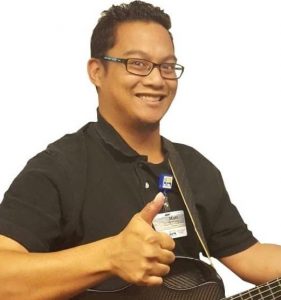MT in Intergenerational Rock Band

 The benefits for all participants are evident when older adult community members and college students gather weekly under the leadership of a music therapist to learn and enjoy music popular across all generations. In this AMTA-Pro podcast, our music therapy colleagues Natalie Wlodarczyk and Matt Valois provide pragmatic guidelines for intergenerational rock band experiences designed to facilitate maintenance of cognitive, psychosocial, and physical skills for older adults while introducing both generations to new music and new experiences. Natalie and Matt discuss field-tested methods for selecting, arranging, and teaching pop music from diverse artists over the decades, and they share ideas for customizing intergenerational music experiences to respond to individual and group needs while promoting wellness, group cohesion, and bonding between the two generations.
The benefits for all participants are evident when older adult community members and college students gather weekly under the leadership of a music therapist to learn and enjoy music popular across all generations. In this AMTA-Pro podcast, our music therapy colleagues Natalie Wlodarczyk and Matt Valois provide pragmatic guidelines for intergenerational rock band experiences designed to facilitate maintenance of cognitive, psychosocial, and physical skills for older adults while introducing both generations to new music and new experiences. Natalie and Matt discuss field-tested methods for selecting, arranging, and teaching pop music from diverse artists over the decades, and they share ideas for customizing intergenerational music experiences to respond to individual and group needs while promoting wellness, group cohesion, and bonding between the two generations.
[display_podcast]
Music Therapy and Intergenerational Rock Band
AMTA-Pro Podcast ~ May, 2019
Natalie Wlodarczyk, PhD, MT-BC and Matt Valois, MT-BC
— + —
Intergenerational programming is a growing area of music therapy clinical practice and research that focuses on pairing older adults with a younger generation to engage in collaborative music-making experiences. Music-based intergenerational programs can facilitate maintenance of cognitive, psychosocial, and physical skills for older adults while introducing both generations to new music and new experiences. Research in this area has focused on improving cross-age interactions, cross-age attitudes, psychosocial well-being, and positive behaviors. Our AMTA-Pro podcast provides pragmatic guidelines for planning an intergenerational rock band experience pairing older adult community members and college students. The podcast includes discussion of methods for selecting, arranging, and teaching concert repertoire with a focus on choosing pop music from diverse artists spanning 1940-2018. The presenters discuss unique song arrangements, use of props and handheld percussion, and choreographed movement. Additionally, the presenters discuss how they incorporate structured conversation into intergenerational music experiences to promote wellness, group cohesion, and bonding between the two generations.
5 Take-Away Points
1. Consider ability levels of all participants and the difficulty level of recreating the songs when choosing music for your intergenerational rock band or group. Find that perfect balance between challenge and feasibility.
2. Consider songs from diverse genres and artists when choosing concert repertoire for an intergenerational rock band. Our group performs songs from 1940 through today.
3. Choose several songs with positive lyrics that convey a message of bringing people together, making memories, or that discuss overcoming adversity. These themes tend to go over well with both the participants and the audience at the culminating concert.
4. Apply your skills in arranging and transposing to adapt concert repertoire to fit the needs and abilities of your group. Consider a key low enough for older adults’ voices but that is also accessible to your younger generation, perhaps through a simple two-part harmony.
5. Incorporate structured conversation into intergenerational music experiences to promote bonding and group cohesion.
NOTE: AMTA-Pro podcast listeners may contact Dr. Wlodarczyk for info related to this program via [email protected]
About the Speakers
Natalie Wlodarczyk, Ph.D., MT-BC, is Director of Music Therapy at Drury University where she has conducted the Drury Intergenerational Rock Band for the last eight years.
Matt Valois, MT-BC is a Drury University graduate and former practicum student for Drury’s Intergenerational Rock Band. He is currently working at Ecumen Hospice in Owatonna, MN.